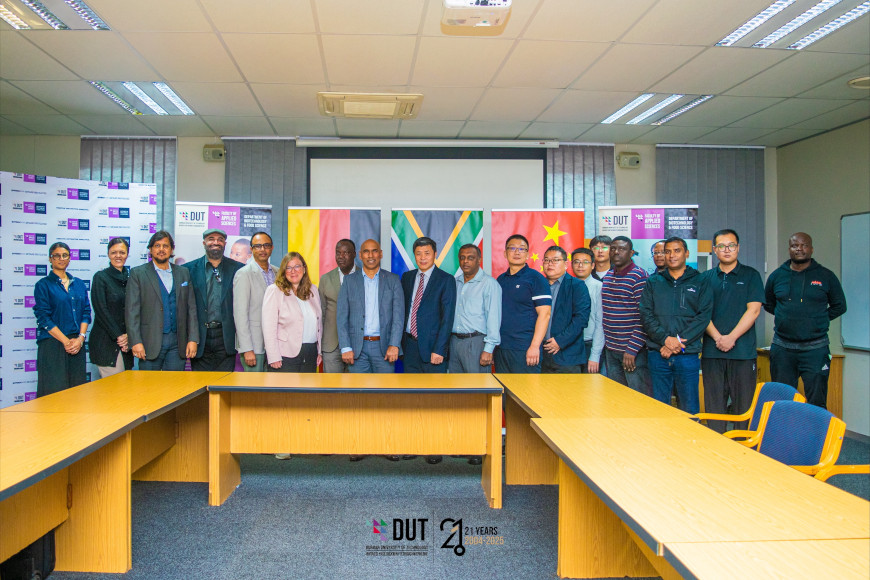In a defining moment for global higher education diplomacy, the Durban University of Technology’s (DUT) Faculty of Applied Sciences (FAS) is orchestrating a remarkable convergence of international scientific partnerships. Faculty of Applied Sciences is celebrating 20 years of transformative collaboration with China while simultaneously launching strategic academic ties with Germany. This dual engagement represents a sophisticated model of 21st-century knowledge diplomacy and directly advances DUT’s ENVISION2030 commitments to global competitiveness and research excellence.
Germany Partnership Concludes: Architecting the Future of Food Science Education
From 24 to 30 September 2025, the Executive Dean of Faculty of Applied Sciences (FAS), Professor Suren Singh and the Department of Biotechnology and Food Science led by Professor Feroz Swalaha (HOD), Professor John Mellem and Prof Eric Amonsou, successfully hosted a high-level delegation from Fulda University of Applied Sciences, Germany, led by Prof. Dr.-Ing. Mamadou Diakité, Dean of the Department of Food Technology, and Dr. Carola Ossenkopp-Wetzig, Overseas Exchange Coordinator . This visit represents a significant new milestone in DUT’s internationalisation strategy aligned to the DHIK/THENSA initiatives which started in 2024, with the Food Science arm led by Professor Suren Singh.
Over six intensive days, the teams visited research labs, evaluated curricula, and created practical frameworks for a joint Food Science Degree programme, enabling an exchange of three students from Fulda University and three from DUT over the three-year undergraduate period. The collaboration also includes staff exchanges, joint research initiatives, and co-supervision of postgraduate students, which will be fully funded by DAAD, a DUT first in terms of undergraduate offerings. These efforts have also produced actionable plans to advance Food Science education and research collaboration between South Africa and Germany, aligning with DUT’s ENVISION 2030 goals for global competitiveness.
China Partnership Commences: Almost Twenty Years of Excellence, Sustained Innovation
Commencing on 30 September 2025 and running until 05 October 2025, the Department of Biotechnology and Food Science is hosting the prestigious South Africa–China Joint Research Programme Meeting 2025, commemorating two decades of pioneering work in advanced sugarcane biorefinery research. Funded by South Africa’s National Research Foundation (NRF) and China’s Ministry of Science and Technology (MOST), this enduring partnership in its Third cycle of Funding has yielded over 40 peer-reviewed publications, facilitated significant technology transfer, and established robust postgraduate training and staff exchange programmes since 2007, making it one of the most successful research collaborations ever between these 2 nations.
The current collaborative focus, “New Generation of Biorefinery Engineering for Sugarcane Industry Development,” is pioneering breakthrough technologies in whole grain processing, sustainable enzyme development, and biodegradable bio-composites. These innovations are critical to addressing global challenges in renewable energy, food security, and sustainable manufacturing.
The distinguished Chinese delegation is led by Professor Zhengxiang Wang, Research Team Leader at Tianjin University of Science and Technology (TUST), who delivered a keynote address on technological innovations for sugar-biomanufacturing. Joining him are Professors Wenjing Huang and Liwei Zhang (Wuhan Polytechnic University) and PhD candidates Mr. Meng Wang and Mr. Ziyang Zhang (TUST) who will spend 2.5 months at DUT as part of their PhD studies linked to the project.
Strategic Imperative and Multi-Lateral Convergence
Professor Suren Singh, Executive Dean of the Faculty of Applied Sciences, articulated the strategic vision driving these engagements: “What we are witnessing is the maturation of Faculty of Applied Sciences as a globally competitive research faculty capable of sustaining long-term partnerships while simultaneously cultivating new strategic relationships. These are carefully architected collaborations designed to create sustained value through research innovation, educational transformation, and meaningful knowledge transfer. This directly operationalises our ENVISION2030 goals and positions DUT as a critical node in global research networks.”
In a powerful demonstration of Faculty of Applied Science’s capacity for sophisticated engagement, the programme featured a joint lunch on 30 September 2025, bringing together the Chinese and German delegations on their respective handover day. This convergence showcased the multi-lateral dimension of Faculty of Applied Science’s international strategy, fostering dialogue on shared research interests in biotechnology and sustainable innovation across three continents.
The DUT team included Professor Feroz Swalaha (Head of Biotechnology and Food Science), Professor Sandhosh KK Pillai, and Professor Kugen Permaul (Team Leader, Enzyme Technology Research Group), with strategic coordination by Dr. Lavern Samuels (Director: International Education and Partnerships).
Looking Forward: Sustained Impact, Expanding Networks
These milestone engagements position the Faculty of Applied Sciences as a strategic asset in South Africa’s higher education internationalisation agenda. They exemplify how universities of technology can leverage global partnerships to drive research innovation, educational excellence, and socio-economic impact.
The convergence of established (China) and emerging (Germany) partnerships creates a multiplier effect, where multi-lateral engagement opens possibilities for triangular research initiatives that benefit students, researchers, industries, and communities across Africa, Asia, and Europe. Faculty of Applied Sciences looks forward to the impactful outcomes of these enduring relationships as they continue to shape the future of biotechnology research and education on the global stage.
Pictured: Faculty of Applied Sciences plays host to Chinese delegates, launching strategic academic ties.
Photographer : Nompumelelo Mpungose
Silindile Buthelezi

